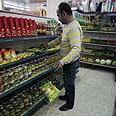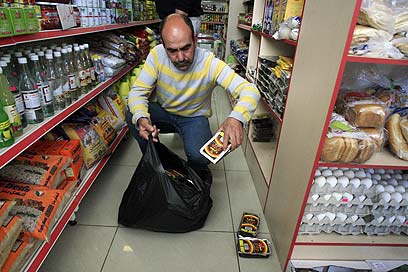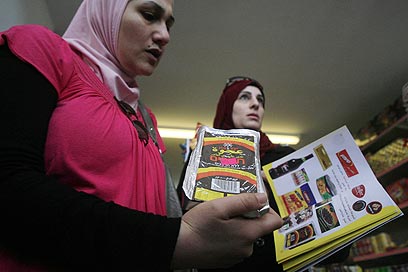
PA inspectors enforce boycott of settlement goods
Palestinian Finance Ministry inspectors raid supermarkets in West Bank; issue warnings to store owners carrying banned merchandise. 'People understand it is for their own benefit,' says inspector Rada Amran
RAMALLAH - A few jars of spicy Yemenite sauce and a couple of boxes of date spread – that's what the Palestinian Finance Ministry inspectors managed to find during a raid last Thursday on supermarkets in the West Bank city of Ramallah.
Inspectors held over 200 raids in Ramallah alone, in an effort to enforce a new law that prohibits the sale of products manufactured in the Jewish settlements.
At this stage, inspectors are refraining from issuing fines and handing out prison sentences, and are making do with issuing warnings and handing out booklets that list the 500 banned products. The merchandise that is seized is confiscated and destroyed.

Inspectors at work (Photo: Issam Rimawi)
Seven inspectors, four men and three women, raid one of the supermarkets in the neighborhood of Umm Sharayat. Inspector Nazmi Hassan cross-references the merchandise on the shelves with the booklet in his hand.
"I know most of the products by heart, but if I'm uncertain, I open the booklet," he says. "At the moment we only issue warnings to the store owners, because we assume they can't tell which products are from the settlements. The banned merchandise is taken away and destroyed," he adds.
The soup dilemma
Hassan and his inspector friends are still uncertain of the punishments that will be given to boycott violators. Their job is to write it down – the rest will be taken care of by the law enforcement authorities and the courts.
One inspector closely examines jars produced by Tara, and tries to find incriminating evidence—but in vain. Before leaving the supermarket, she spots chicken soup packets produced by Achla.

Comparing products (Photo: Issam Rimawi)
The inspectors are helpless; the packaging doesn't list the place of manufacturing. They take the packets off the shelf and consult each other, but the store owner enjoys the benefit of the doubt – and finally the 20 packets are returned to the shelf.
The inspectors find two jars of Yemenite skhug sauce produced in the settlement of Barkan, and the store owner quickly swears that those were the last two jars in the store.
Ra'ad Hussein, the store owner, says he didn't know the skhug was manufactured in a settlement. "We are wiling to cooperate with the process. I think it will help fight the settlements and the occupation," he says, adding that he will get reimbursed by the supplier.
When the inspectors are done, they give Hussein the famous booklet, place a sticker on the doorframe and leave the store.
'Come to a hearing'
The next raid concludes with hardly any findings, but at the last moment, the inspector's eye glances over date packages manufactured in Bikat Beit Shean.
Although most of the company's produce is grown in areas that are within the Green Line, the merchandise is taken off the shelves. The salesperson immediately calls the store owner, who promptly asks to speak with Chief Inspector Qadi.
Qadi's expression indicates that he is not happy with the tone on the other side of the line. "If this is your attitude, you can come to a hearing. We are acting on behalf of a presidential edict and a government decision," Qadi tells the store owner.
"No, we can't leave the product in the store," he adds. Qadi is not taken aback by the owner's attitude – many merchants try to argue and refuse, but "the law must be enforced," he says.
Inspector Rada Amran is happy with the work. "All in all, there is a good response on behalf of the merchants and the population in general," she says. "People call our hotline and log onto our internet site to inform us of places that sell settlement products. People understand that it is for their own benefit," she adds.
"The problem is that those who need to set an example – I mean our leaders – prefer Israeli goods because they are considered to be of better quality," says a customer. When asked how long he thinks the boycott will last, he says "I don't know, I guess until the Israelis get upset and start pressuring us."










